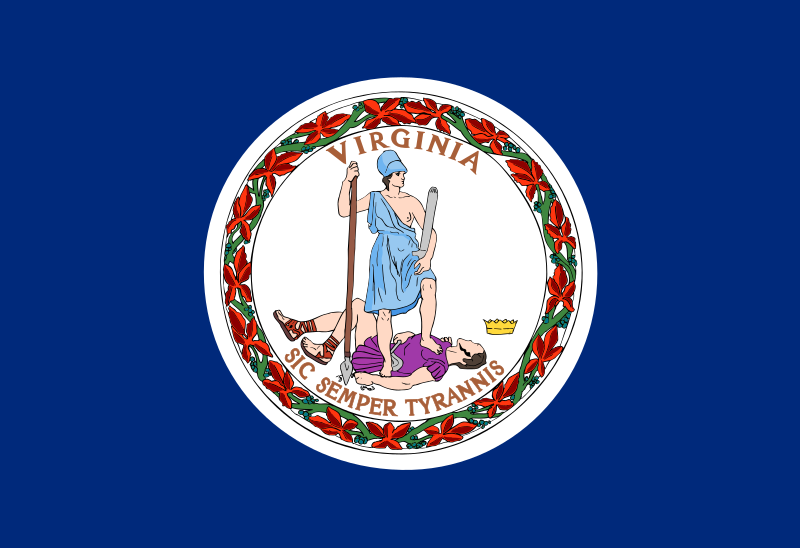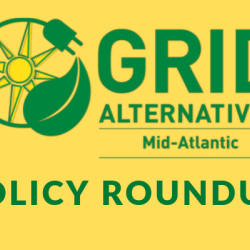Good morning from the Mid-Atlantic region! This is the second edition of the GRID Alternatives Mid-Atlantic Policy Roundup, keeping you up-to-date on renewable energy policy in the Mid-Atlantic region and beyond. This month’s edition includes some ups and some downs in terms of renewable energy policy. We continue, however, to be inspired to search for solutions that make renewable energy available to everyone.
*
*
*
DC 
New community solar zoning rules could add delays and costs to future projects
Through its Solar for All program, the District of Columbia has committed to ensuring that 100,000 low-income residents receive the benefits of solar by 2032. Community solar is a crucial way to get these benefits to those lacking a suitable rooftop for solar, such as renters. However, the Zoning Commission for the District of Columbia has issued new community solar zoning rules that will require many new community solar projects to go through the potentially burdensome process of obtaining a special exception before they can be installed.
All ground-mounted or canopy community solar facilities that are more than 1.5 acres in panel face area, or above 20 feet high, or have any panels sited within 40 feet of any adjacent property in residential and certain other zones, would have to go through a special exception process that would result in delays and added costs.
We are hopeful that these new rules will not further burden future projects that make solar energy accessible for previously untapped areas.
Those wishing to comment on the rulemaking action should send correspondence to Sharon Schellin, Secretary to the Zoning Commission, at zcsubmissions@dc.gov. Comments must be submitted by July 28.
Pepco looking to raise fixed utility charges
Pepco, the utility company that serves approximately 883,000 customers in D.C. and Maryland, announced in June its intention to raise its fixed charges on residential customers in the District by 43 percent to $21.60 by 2022. While Pepco justifies its request in part based on costs to upgrade the distribution system to handle more renewables and electric vehicles, some analysts say the added fixed costs could do more to harm the transition to renewables than help. (A Residential Aid Discount can be applied to the fixed distribution charge for residents that make less than 60 percent of the state median income.) MDV-SEIA, the regional solar industry trade association, has filed to intervene about the fixed charge increase.
MARYLAND 
Montgomery County to launch climate planning process to meet emission goals
Elle Meyers of the Montgomery County Sentinel reported technical workgroups made up of volunteers will review past reports and plans compiled by the county and other areas of the country and will recommend strategies that will reduce "emissions in an equitable manner." County personnel said there were hundreds of applications submitted to participate in the technical workgroups. As a member of one of the technical workgroups, Policy and Regulatory Manager Alexandra Wyatt ensures GRID Alternatives has a seat at the table to advocate for equity in emission reduction and its benefits.
The county's greenhouse gas reduction goal is set at 80 percent by 2027 and 100 percent by 2035. The technical groups are expected to meet through the end of 2019.
VIRGINIA 
GRID Mid-Atlantic provides feedback on program to provide solar incentives for low-income, elderly, and disabled individuals
The Virginia General Assembly approved House Bill 2789 in March, a win for bringing the power of clean energy to underrepresented communities in the state. The law requires Dominion Energy and the Appalachian Power Company to develop and implement a three-year program that provides up to $25 million in incentives to low-income, elderly, and disabled individuals for residential energy conservation and solar generation.
As a stakeholder workshop participant, GRID Mid-Atlantic has provided feedback on the program for Dominion Energy. GRID Mid-Atlantic’s feedback included the following points of emphasis, among many others:
Individuals served by the program should owe no upfront payment and should not have to meet qualifications such as a minimum credit score, minimum income, or minimum energy use
Individuals served should receive meaningful, near-term, ongoing economic savings — many low-income solar programs aim to achieve an average of 50 percent household electric bill savings
Benefits of energy conservation and solar installed for multifamily housing should go to tenants through savings on utility bills, rent, and/or enhancements to health and safety
Installation of new energy conservation and solar should projects provide a unique opportunity to provide hands-on training for interested community members, enabling them to join the growing clean energy economy
Fairfax County designated SolSmart-Silver for advancement of solar energy growth
The SolSmart program was created to award cities, counties, and regional organizations that foster the development of solar markets by removing red tape and burdensome requirements that discourage solar growth.
In 2017, Fairfax County launched the Solarize campaign, which provides free onsite solar assessments, bulk discount pricing, vetted contractors, community workshops, and the option to purchase electric vehicle charging stations to all interested residents. In 2019, through partnerships with the Northern Virginia Regional Commission and the nonprofit Local Energy Alliance Program, Solarize was able to offer prices 17 percent less than the Virginia average for a 6 kW system.
NATIONAL 
Twenty U.S. Senators sign letter urging extension of clean energy tax incentives
Federal clean energy tax incentives are set to phase down at the end of this year, forcing some Senators to call their colleagues to action.
“Because of these credits, solar energy has averaged 50 percent annual growth for a decade,” the letter, written on July 19, states. “We hope that in light of the urgency of addressing climate change, you are able to join us in prioritizing the continuation of clean energy tax incentives and avoid a situation in which our country is left without any major federal policy encouraging solar and other renewable energy generation investments.”
We encourage you to reach out to your representatives in Congress to ask them to renew tax credits that help make renewable energy accessible for all. To go further, Congress could make the credits refundable, so that low-income households can access the credits directly regardless of their tax liability.
Data For Progress rates 2020 Democratic candidates on Green New Deal support
Twelve candidates so far have released policy agendas regarding climate, which Data For Progress then cross-referenced with the core tenets of the Green New Deal. Candidates with full plans also received individual scorecards.
The scorecards include grades for Energy Democracy, Just Transition, Workforce Development and Training, and Environmental and Social Justice standards.
The next Democratic Primary Debate will be hosted by CNN on July 30-31 in Detroit.
GRID Alternatives joins panel at Congressional Clean Energy Expo & Policy Forum
During the forum, which was held at the House Rayburn Office Building, Alexandra Wyatt contributed to a panel titled “Renewables, Efficiency, and Sustainable Transportation: Driving Growth and Jobs.” Before an audience of congressional staff and others, she emphasized the policy opportunities available to combine renewable energy promotion with economic and workforce development.
The forum was sponsored by the Environmental and Energy Study Institute and co-sponsored by the House Renewable Energy & Energy Efficiency Caucus. GRID Alternatives Mid-Atlantic also tabled at the expo.

